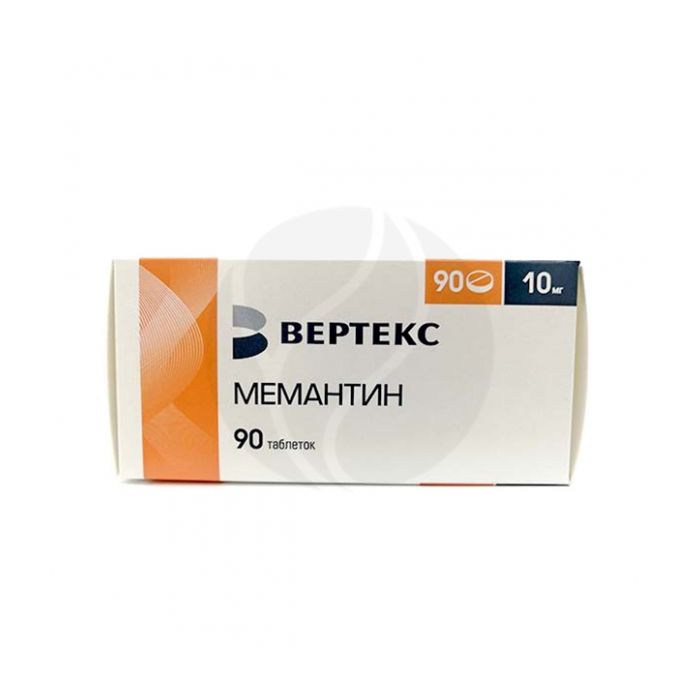Memantine tablets 10mg, No. 90
Expiration Date: 05/2027
Russian Pharmacy name:
Мемантин таблетки 10мг, №90
For oral administration, the initial dose for adults is 5 mg / day. In the future, the dose can be increased weekly by 5 mg. The average maintenance dose is 10-20 mg / day. The maximum dose is 20 mg / day.
Active ingredient: memantine hydrochloride
Hypersensitivity to memantine;
severe liver failure;
pregnancy;
lactation period (breastfeeding);
children and adolescents under 18 years of age (the effectiveness and safety of the drug have not been established).
With care: epilepsy, thyrotoxicosis, predisposition to seizures, concomitant use of NMDA receptor antagonists (amantadine, ketamine, dextromethorphan), factors that increase urine pH (sudden dietary changes, for example, switching to vegetarianism, abundant intake of alkaline gastric buffers), renal tubular acidosis, severe urinary tract infections caused by Proteusspp., myocardial infarction (history), heart failure, uncontrolled arterial hypertension, renal failure, mild to moderate hepatic impairment (Child-Pugh class A and B).
pharmachologic effect
A remedy for dementia. It is a non-competitive antagonist of glutamate NMDA receptors (including in the substantia nigra), as a result of which it reduces the excessive stimulating effect of cortical glutamate neurons on the neostriatum, which develops against the background of insufficient release of dopamine. By reducing the supply of Ca2 + to neurons, it reduces the possibility of their destruction.
It has a nootropic, cerebrovasodilating, antihypoxic and psychostimulating effect.
Improves weakened memory, increases the ability to concentrate, reduces fatigue and depression symptoms, and reduces skeletal muscle spasticity caused by diseases or brain damage.
Pharmacokinetics
After oral administration, it is rapidly and completely absorbed from the gastrointestinal tract. Cmax is achieved after 3-8 hours. Plasma protein binding is 45%. When taken in a dose of 20 mg / day, a Css of 70 to 150 ng / ml is achieved. Vd is 10 l / kg. Partially metabolized in the liver. It is excreted by the kidneys. T1 / 2 is - 60-100 hours; the clearance is 170 ml / min / 1.73 m2.
Side effect
From the immune system: often - hypersensitivity reactions.
From the side of the psyche: often - drowsiness; infrequently - confusion, hallucinations (mainly observed in patients with Alzheimer's disease at the stage of severe dementia), the frequency is unknown - mental reactions.
From the nervous system: often - dizziness, imbalance; infrequently - gait disturbance; very rarely - convulsions.
From the side of the cardiovascular system: often - increased blood pressure; infrequently - heart failure, venous thrombosis and / or thromboembolism.
From the digestive system: often - constipation; infrequently - vomiting, nausea; frequency unknown - pancreatitis.
On the part of the liver and biliary tract: often - increased indices of 'hepatic' enzymes; frequency unknown - hepatitis.
From the hematopoietic system: the frequency is unknown - agranulocytosis, leukopenia (including neutropenia), pancytopenia, thrombocytopenia, thrombocytopenic purpura.
Others: often - headache, shortness of breath; infrequently - fungal infections, fatigue; frequency unknown - acute renal failure, Stevens-Johnson syndrome.
Application during pregnancy and lactation
Contraindicated for use during pregnancy and lactation (breastfeeding).
Application for violations of liver function
Contraindicated for use in severe hepatic impairment (class C on the Child-Pugh scale). Use with caution in mild to moderate hepatic impairment (class A and B on the Child-Pugh scale)
Application for impaired renal function
Contraindicated for use in renal failure. Use with caution in renal tubular acidosis, severe urinary tract infections caused by Proteus spp.
Application in children
Contraindicated for use in children and adolescents under the age of 18 years (efficacy and safety have not been established).
special instructions
It should be used with caution in patients with epilepsy, renal failure, thyrotoxicosis, a history of convulsions, arterial hypertension, a history of myocardial infarction, heart failure.
The concomitant use of memantine and NMDA receptor antagonists such as amantadine, ketamine, or dextromethorphan should be avoided. These compounds act on the same receptor system as memantine, therefore, adverse reactions (mainly related to the central nervous system) may occur more often and be more pronounced.
The patient has factors that can increase urine pH (sudden changes in diet, such as switching from an animal-based diet to a vegetarian diet, or heavy intake of alkaline gastric buffers), renal tubular acidosis or severe urinary tract infections, caused by Proteusspp., require careful monitoring of the patient's condition.
Influence on the ability to drive vehicles and mechanisms
In patients with Alzheimer's disease at the stage of moderate to severe dementia, the ability to drive vehicles and control complex mechanisms is usually impaired. In addition, memantine can cause a change in the reaction rate, therefore, patients should refrain from driving vehicles or working with complex mechanisms.
Drug interactions
With the simultaneous use of memantine can reduce the effects of barbiturates and antipsychotics.
The action of baclofen and dantrolene may be altered by memantine (this combination may require dose adjustments).
The effects of levodopa, dopamine receptor agonists and anticholinergics are enhanced by concomitant use of NMDA receptor antagonists.
Due to the fact that memantine and amantadine are NMDA receptor antagonists, simultaneous use should be avoided due to the risk of toxic effects.
Combinations of memantine with ketamine, dextromethorphan and phenytoin are also potentially toxic.
For the transport of amantadine, cimetidine, ranitidine, quinidine, quinine and nicotine in the body, the same renal cation system is used, which can cause the interaction of these drugs with memantine, leading to an increase in its concentration in blood plasma.
With the simultaneous use of memantine can cause a decrease in the concentration of hydrochlorothiazide in the blood serum.
When used simultaneously with warfarin and other indirect anticoagulants, careful monitoring of prothrombin time and INR is required.
Concomitant use with antidepressants, selective serotonin reuptake inhibitors and monoamine oxidase inhibitors requires careful monitoring of patients.

